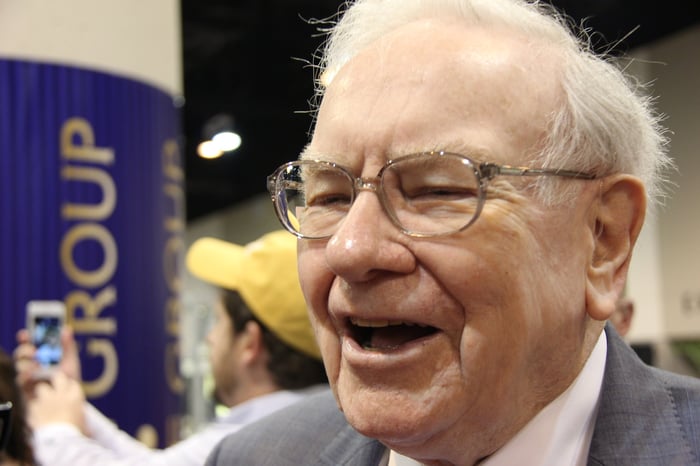Few money managers command the attention of Wall Street professionals and everyday investors quite like Berkshire Hathaway (BRK.A -0.28%) (BRK.B -0.68%) CEO Warren Buffett. Although Buffett isn't infallible, he's overseen an impressive 20.1% average annual return for his company's Class A shares (BRK.A) since taking the reins in 1965. That's good for a greater than 3,600,000% aggregate return.
In short, when the Oracle of Omaha (as Buffett has come to be known) buys or sells shares of a company, investors wisely pay attention.

Berkshire Hathaway CEO Warren Buffett. Image source: The Motley Fool.
Warren Buffett has a $5.9 billion secret portfolio you probably don't know about
Normally, riding Buffett's coattails is easy to do. Money managers with over $100 million in assets under management are required to file Form 13F with the Securities and Exchange Commission within 45 days following the end of a quarter. A 13F is effectively a snapshot that tells investors what the brightest minds on Wall Street bought, sold, and held onto in the most recent quarter. Since Berkshire Hathaway's investment portfolio topped $313 billion as of last week, it most definitely must file a quarterly 13F.
But what you might be surprised to learn is that Berkshire Hathaway's 13F doesn't tell the full story regarding Buffett's holdings.
In 1998, Buffett's company acquired reinsurance company General Re for $22 billion. While the reinsurance business was the crown jewel of this buyout, General Re also ran a specialty investment company known as New England Asset Management (NEAM). When Berkshire bought General Re, it also took ownership of NEAM.
As of the end of June 2022, New England Asset Management had more than $5.9 billion in assets under management. Although Buffett doesn't control where NEAM's assets are invested, the securities NEAM holds in its investment portfolio are, ultimately, owned by Warren Buffett's company, Berkshire Hathaway. In other words, Buffett has a hidden $5.9 billion portfolio.
In 2022, this hidden portfolio has been aggressively buying two stocks.
Chevron
The first stock Warren Buffett's secret portfolio has bought hand over fist is oil giant Chevron (CVX 0.44%). During the second quarter alone, New England Asset Management purchased nearly 2.1 million shares.
If you're wondering why money managers are piling into global energy companies, look no further than broken or challenged energy supply chains. Russia's invasion of Ukraine has the potential to adversely impact the flow of oil and natural gas into Europe for a long time to come. Additionally, reduced capital investment from global energy majors due to COVID-19-related uncertainty has slowed production expansion. There's no easy way to quickly boost oil and gas supply to meet demand, which is a recipe for energy commodity prices to remain elevated.
On a more company-specific basis, Chevron is a logical choice given its integrated operating structure. Although it generates its juiciest margins from its upstream drilling segment, Chevron also operates midstream (e.g., transmission pipelines) and downstream (e.g., chemical plants and refineries) assets.
Midstream companies almost always rely on long-term fixed-fee or volume-based contracts that yield highly predictable operating cash flow. Meanwhile, downstream companies benefit from lower input costs if crude oil prices weaken. Chevron is effectively well hedged no matter what happens with the price of oil or natural gas.
Chevron's balance sheet might also be the best among global energy majors. With a low debt-to-equity ratio of 17%, Chevron has plenty of flexibility to make strategic moves and advance its key projects.

Image source: Getty Images.
HP
The second stock that Warren Buffett's hidden portfolio can't stop buying is personal computing (PC) and printing solutions company HP (HPQ 1.55%). During the second quarter, New England Asset Management bought more than 16.3 million shares of HP, which increased its existing stake by (drum roll) 11,092% from the previous quarter.
The answer to "Why HP?" likely has to do with the predictability of the PC industry and the company's valuation.
During the pandemic, PC sales climbed as the labor force shifted from an office-based to a hybrid work environment. Even with some employees now returning to the office, more workers than ever are continuing to operate remotely. That's been a multiyear positive for HP, and it should help produce somewhat predictable operating cash flow on a year-to-year basis.
Another reason NEAM's investment team piled into HP could very well be its valuation. During bear markets, Wall Street becomes less willing to tolerate money-losing businesses and companies trading with premium valuations. Though HP isn't the growth story it once was, the company is valued at a very reasonable six times Wall Street's forecast earnings for 2022. As long as the company's core PC and printing solutions businesses don't completely falter, it's fair to assume that a relatively safe floor is built beneath HP's current share price.
As one final note, HP increased its dividend by 29% last year, and it's been regularly conducting share buybacks. A healthy capital return program is something Warren Buffett and NEAM's investment team seem to love.




